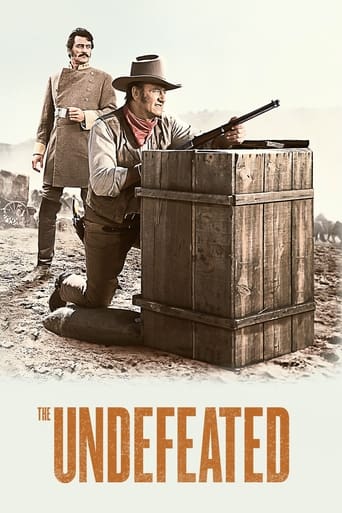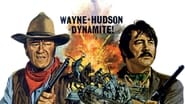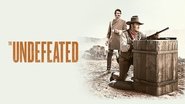Benedito Dias Rodrigues
I'd watched this movie for first time in 1978 on TV and more two times now on DVD colorful,widescreen and dubbed version of course l found it better than before,John Wayne and Rock Hudson did a good job indeed,together with a great supporting casting...the story is really unbelievable if you has a minimum brain,how a rich southern Colonel will move to Mexico after lost the war??...leaving behind a large property...such wrong decision...well the film was funny like others John Wayne's movies...like Dub Taylor and his Cat a priceless characters....the other plot Wayne leaving the Army to catch wild horses to sell isn't untrue,but to sell all 3.000 horses and delivery inside the Mexico having the possibility to make this on the safe border,it's another stupid thing....Undefeated just a pleasant movie and so!!!
Bob-45
The story of two remarkable men whose deeply flawed world views were irrevocably changed for the better makes for an very interesting theme. To set this theme against the backdrop of both the War of Secession ("War Between the States") AND the Mexican Revolution makes "The Undefeated" all the more promising. Furthermore, parallels to Vietnam make "The Undefeated" a downright profound story. Sadly, Andrew V. McLaglen tepid direction and bland casting of the female characters makes "The Undefeated" an unfulfilled promise and so-so effort.To understand the profundity of "The Undefeated" requires a crash course in the War of Secession. Though slavery was a major issue, it was NOT the primary cause of hostilities. Revolutionary War debt was coming due and many states that remained with the union had not paid their debts. However, states that joined the Confederacy HAD paid their debt and resented draconian tariffs on goods entering and leaving their harbors. Secession was recognized and accepted, as it is a basic part of the Declaration of Independence and of the Congressional Record at the time of the enactment of the US Constitution. Even Lincoln, as a member of Congress, recognized the right of secession. For those who still insist the war was about slavery, keep in mind four slave states remained in the union.It is time now to discuss the flawed world views of both union Colonel John Henry Thomas (John Wayne) and confederate Colonel James Langdon (Rock Hudson). Thomas is a decent, kind hearted man, but his world view is quite callous. Thomas thinks nothing of taking his loyal men into strife-torn Mexico, even though he knows they may be killed and that none of them has seen home for four years. Langdon is also decent and kind hearted, but his vanity leads him to destroy his property and take his family into Mexico to fight alongside General Maximilian, who is doing to the citizens of Mexico what the Union did to the Confederacy. BOTH men receive a deserved comeuppance from Juarista General Rojas (Tony Aguilar). I am sure this would be lost on most American audiences even today even in the hands of a more skilled western director, such as John Ford, Howard Hawks, Sergio Leone, Anthony Mann, Budd Boetticher, Fred Zinnemann or even Henry Hathaway.The finest performances in "The Undefeated" come from Rock Hudson and Roman Gabriel. Unfortunately, their same-sex antics drew publicity which clearly eclipsed the movie. Other fine performances include the aforementioned Tony Aguilar (whose reluctance and relief at a key moment is the best scene of the film), Merlin Olsen (as a wise man who prefers the company of children to adults), Royal Dano (who reveals the true theme of "The Undefeated") and Big John Hamilton (who proves one does not have to fight a war or appear unafraid to be a hero).Hugo Montenegro, who had a top 40 hit channeling Ennio Morricone with "The Theme From 'The Good, The Bad & The Ugly') here channels Elmer Bernstein with his music. While not "great Bernstein," Montenegro's score is at least "good Bernstein".I give "The Undefeated" a "6".
SnoopyStyle
After the Civil War, ex-Union Colonel John Henry Thomas (John Wayne) is leading his horses to be sold to the Mexican government. In the meanwhile, ex-Confederate Colonel James Langdon (Rock Hudson) is leading a rag-tag group of southerners who are going south to escape the Yankee mob. Both groups decide to join up as they fight off bandits and revolutionaries.This is a southerners wet dream. The southern forces are noble, honorable, and full of hospitality. They are fighting off arrogant Yankee carpetbaggers with their uppity blacks. Meanwhile their slaves are obedient, quietly waiting for the future as the master gives a family heirloom to an old slave.This is through and through an old fashion western where men are men. They have a good old fight after a good stiff drink. There is an impressive herd of horses. If you're willing to live with the hokey story, then this is definitely watchable.
James Hitchcock
The title of "The Undefeated" refers to those Confederates who refused to accept defeat in the American Civil War and migrated to Mexico rather than live under the Union. The film is loosely based on a true story, although the details are very much fictionalised. A group of Confederate soldiers, led by Colonel James Langdon, make their way with their families across Texas, hoping to cross the Rio Grande and to join Emperor Maximilian of Mexico, who has offered them land where they can make a new life. Langdon was once a wealthy plantation owner, but has been ruined financially by the war, and before leaving sets fire to his mansion rather than see it fall into the hands of Northerners.On the journey, Langdon meets an old Civil War antagonist, Colonel John Henry Thomas, who is leading a group of his former soldiers on an expedition to capture a herd of wild horses, which he is hoping to sell to the US government. Upon learning, however, that the Mexican government are willing to pay a better price, Thomas and his men also turn south with their captive herd. The film tells the story of what happens when the two groups of Americans, former enemies, are forced to work together to fight off attacks from bandits and from the Juaristas, republican opponents of Maximilian's government.A number of Westerns from this period had a Mexican-related theme and generally involve Americans becoming embroiled in either the Mexican civil war of the 1860s or the Mexican Revolution of the 1910s; others include "The Wild Bunch", "Two Mules for Sister Sara" and "The Professionals", with "Veracruz" being an earlier example from the fifties. The makers of "The Undefeated", however, were less concerned with the intricacies of Mexican politics than they were with putting across a message of American patriotism. Although the Confederates and Unionists have recently been fighting one another, they learn to respect one another and to unite against a common foe. Thomas and his men not only help the Confederates fight the bandits, they also give up their horses to ransom them when they are being held hostage by a Juarista general.The old divisions- North versus South, blue versus grey, abolitionists versus advocates of slavery- no longer matter; the reconciliation between the two groups takes place, very symbolically, at a Fourth of July party. What matters is that former Confederates and former Unionists are all now Americans, united against the world. Even non-whites are included; a romance develops between Thomas's adopted Indian son Blue Boy and Langdon's daughter. The implied message for the Americans of 1969 is that they must learn to overcome their own divisions- conservative versus liberal, young versus old, black versus white, pro-Vietnam war versus pacifists- in a similar way.This message of inclusive patriotism would have been dear to the heart of one of the film's two big stars, John Wayne, who plays Thomas. The following year Wayne was to make another Western, "Rio Lobo", about Northerners and Southerners learning to live together after the Civil War. It is a potentially interesting theme, but not one which this film makes the most of. Rock Hudson's performance as a Southern gentleman has been criticised, but for me he was not the problem with the film. I will leave comment on his accent to those who are more familiar with the dialects of the Deep South than I am, but I found his portrayal of a proud and honourable aristocrat a convincing one. John Wayne, however, had already shown in "The Green Berets" the year before that he was really too old to go on playing a front-line soldier, and he is no more credible here. The film also contains a few other implausible elements. There may have been men in the 1860s who would have had no objection to their daughter entering into a racially mixed marriage, but I doubt if a die-hard Confederate aristocrat like Langdon would have been one of them. The film ends with both Langdon and Thomas on surprisingly good terms with the Juarista General Rojas, even though he has shown himself to be both ruthless and treacherous and has threatened to shoot the Confederates in cold blood if his ransom demands are not met. The film is also overlong and its pace, particularly during the second half, tends to flag.The late sixties and early seventies saw the last great hurrah of the Western before its decline in the late seventies and eighties, but "The Undefeated" cannot compare in quality with some of the other offerings from the period, such as "The Wild Bunch", or Wayne's other film from 1969, "True Grit", or even with "Chisum", another collaboration between Wayne and director Andrew V. McLaglen from the following year. It is marginally better than the non-Western "The Green Berets", but to say that about a film is no very great praise. 5/10






